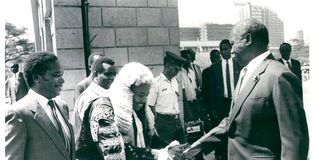Premium
Joshua Kulei firm accused of fraud in Moi and Biwott land deal

Mr Nicholas Biwott, National Assembly Speaker Moses Keino and President Daniel arap Moi in 1990. The 44-acre piece of land in Westlands is claimed by companies linked to Joshua Kulei, Moi and Biwott.
The battle for the properties said to belong to former President Daniel arap Moi and Cabinet Minister Nicholas Biwott is far from over, with claims of fraud and manipulation emerging.
The Court of Appeal has declined to strike out a civil suit pitting two firms associated with Moi and his former aide Joshua Kulei over a prime piece of land in Westlands, Nairobi.
The 44-acre parcel, part of the 88 acres on Peponi Road, is being claimed by Belgo Holdings Ltd associated with Mr Kulei on one hand and Lakeview Development Ltd linked to Moi and Biwott.
The two companies at one time shared a director – Mr Akbar Esmail.
Lakeview says Mr Kulei company obtained the title deed fraudulently after being given transfer documents before conclusion of a sale agreement in 1995.
Belgo is accused of transferring the property to itself and shunting the interests of Moi and Biwott.
Lakeview moved to court in 2020, accusing Kulei’s firm of illegally obtaining the title deed.
Original transfer documents
It sought court orders to compel Belgo Holdings to vacate the land and the cancellation of the title.
The firm also sought an order of status quo stopping the transfer or sale of the property, pending the determination of the case. The application was allowed.
Mr Kulei, however, asked the court to strike out the case, saying he has been occupying the land peacefully for more than 12 years and that the registration of the title was lawful.
He added that the case against Belgo was defective because it was lodged without the authority of the company’s board of directors.
Mr Kulei maintained that he paid the full price of Sh20 million when he acquired the land in 1995.
Moi’s one-time personal secretary sought for the striking out of the case but the application was rejected by the Environment and Land Court, thereby giving rise to the appeal.
A bench of three Appellate Court judges upheld the decision of the lower court, saying it was in the interest of justice for the status quo to be maintained.
“We are satisfied that the learned judge cannot be faulted in the manner in which he went about considering whether Lakeview had established a prima facie case,” justices Hannah Okwengu, Asike Makhandia and Kathurima M’Inoti said.
The Court of Appeal said the issue of ownership between Mr Kulei, Moi and Biwott regarding the properties was contentious and urged for maintaining of the status quo.
Also Read: Moi firm sued over Thika road land
Evidence tabled in court indicated that Lakeview owned the land. It entered into an agreement with Belgo to sell the 44 acres for Sh20 million in May 1995.
Lakeview said it signed and gave Belgo copies of the transfer documents to enable it arrange financing for the purchase.
But Lakeview reportedly retained the original transfer documents on the understanding that they would be handed over once Mr Kulei’s company made full payment.
The copy of the transfer was said to have been given on the basis of trust because the firms shared Mr Esmail as a director.
At the time, Mr Esmail was a shareholder and managing director of Belgo Holdings.
But in breach of the agreement and misrepresentation, Belgo reportedly told the Land Registrar that the original transfer was lost and in the process, transfer the two parcels of land without paying a cent.
Lakeview said it discovered the fraud in September 2018 and demanded full payment before rescinding the agreement.
Mr Kulei denied the claims, saying Lakeview should have challenged the registration of the properties within a year from the date of registration.
He maintained that he paid the full amount and that the transaction was acknowledged in the agreement for sale and other correspondence.
The Environment and Land Court said the issues contested – including whether the full amount was settled, whether the transfer was genuine and whether consent of the Land Control Board was obtained – would be determined after full hearing.
“Whether the appellant (Belgo) holds the suit property in trust to the first respondent (Lakeview), and many others, are matters to be determined at the hearing and for which the judge cannot be faulted for refusing to make findings on,” the Court of Appeal judges said.





